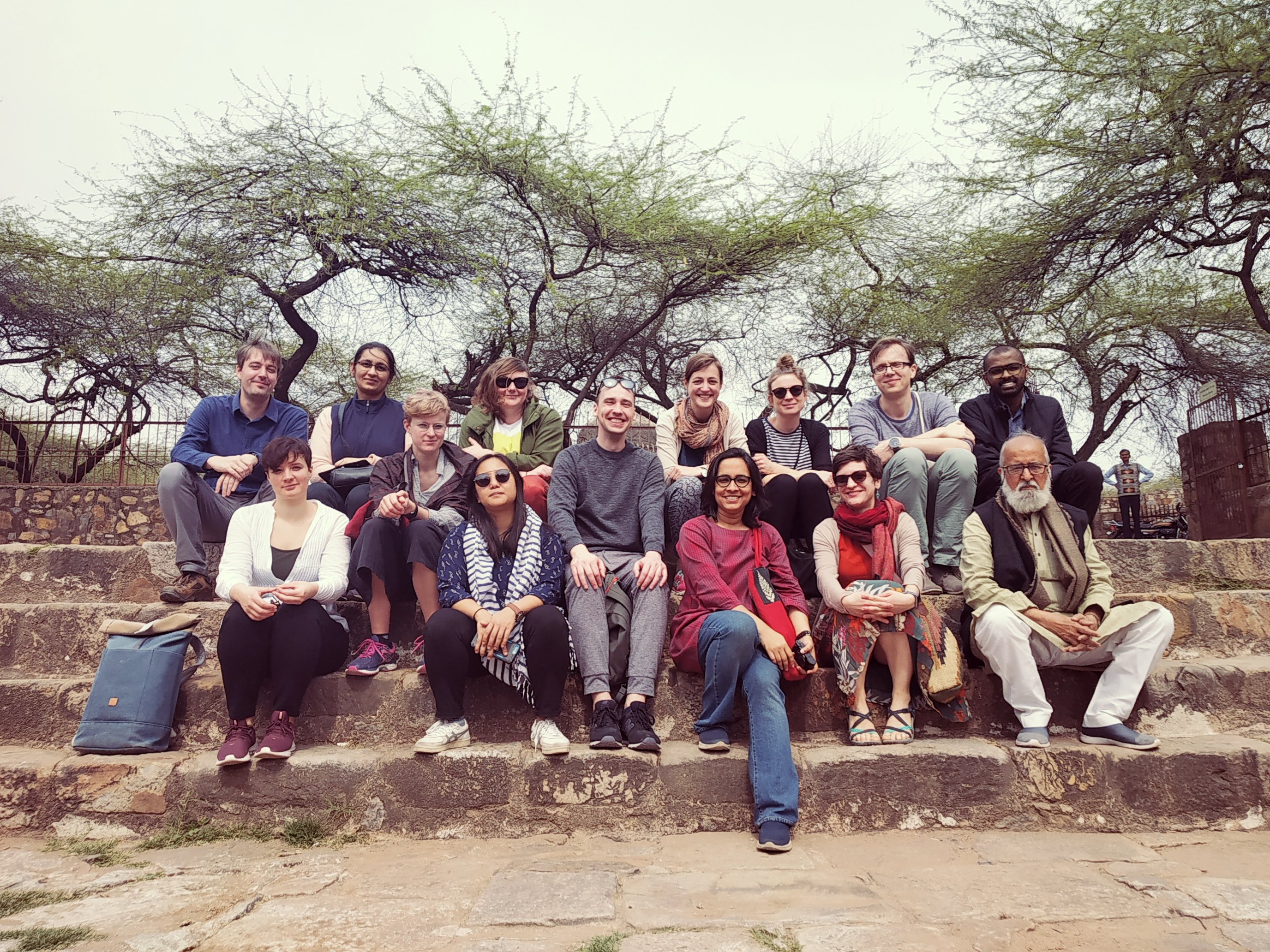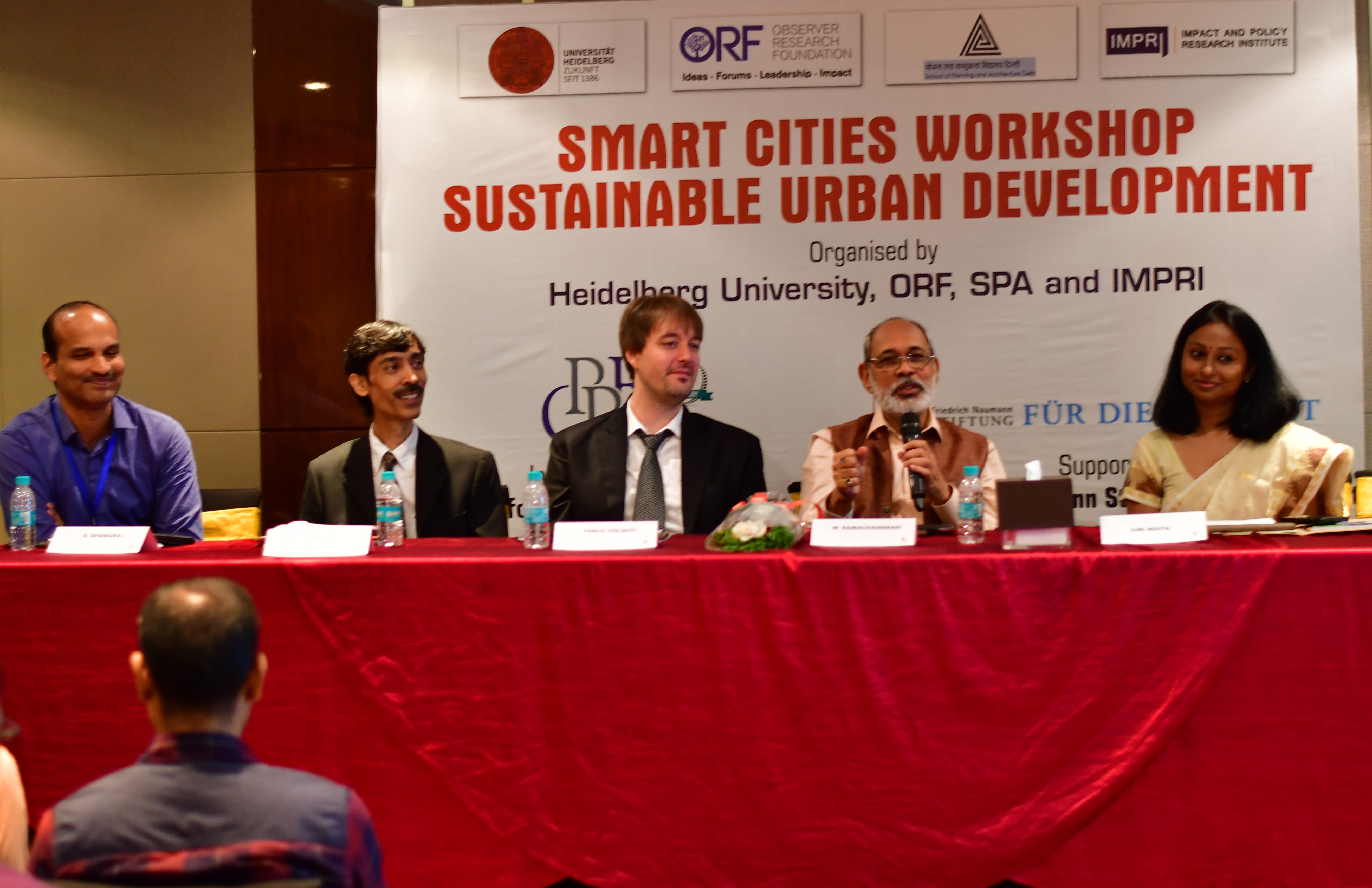News


Another element of the Winter School was a panel discussion about the languages of global history during which various scholars discussed their work in relation to the topic of the Winter School. Felix Brahm (GHIL), Monica Juneja (HCTS), Joachim Kurtz (HCTS), Dhruv Raina (Jawaharlal Nehru University) and Rekha Vaidya Rajan (Jawaharlal Nehru University) outlined the ways in which they apply the languages of global history in their work. Neeladri Bhattacharya (Jawaharlal Nehru University) acted as chair and provided insightful comments on all presentations, identifying their common themes and perspectives in light of the concept of global history. The panel discussion demonstrated how works that address a variety of different topics such as the concept of art, firearms trade in the nineteenth century and the history of scientific knowledge can speak to each other when looked at through the conceptual lens of global history.
The Winter School also included a heritage walk through the neighborhood of Mehrauli which was attended by several participants. The walk was guided by academician, historian and filmmaker Sohail Hashmi who familiarized participants with the historical landmarks of the neighborhood, outlined the architectural features of mosques, graves and water tanks in the area and talked about contemporary attempts aiming at the preservation of these monuments. This event enabled participants of the Winter School to get a first-hand experience of the living and breathing history of Delhi and its significance in the current cityspace.
During the final two days of the Winter School, participants presented their own research projects, their research methodology and the ways in which they engage with global history approaches in their work. In addition, posters summarizing their respective research projects which they had prepared in advance of the Winter School were exhibited at the event venue. The participants received feedback on their projects from the experts and organizers of the Winter School and in turn provided feedback on how to improve future events within this framework to the organizers of the Winter School.
Each film that was screened during the Film Festival was assigned a discussant who provided additional insights about the process of making the film or about the general topics addressed by the film. The discussants included film directors, actors, as well as experts and activists in the fields of gerontology, senior care, film studies and age-related therapy. The selection of films included German, American and Indian films that tackled various topics related to ageing, such as family dynamics, social expectations in regard to ageing, innovative therapy models for elderly people, as well as ways of coping with age-related diseases such as dementia and Alzheimer's disease. All film screenings were well attended and spurred engaged and sometimes deeply personal and intimate conversations between visitors, discussants and the organizers of the Film Festival.
Based on the positive resonance that the expansion of the Film Festival for Generations to India has garnered so far, visions for the future of the Film Festival in India were also discussed. During a Workshop on "Fifty Ways to organize an Intergenerational Film Festival", several experts and multiplicators met to suggest possibilities of making the Film Festival for Generations a permanent event in India and reaching out to even wider audiences. Another Film Festival for Generations in India is planned for 2020.

A workshop on "Smart cities and sustainable urbanism" was held in Kochi on September 20, 2019. It was organized by the South Asia Institute of Heidelberg University (Branch Office New Delhi), Observer Research Foundation (ORF), School of Planning and Architecture (SPA), and Impact and Policy Research Institute (IMPRI), in collaboration with Centre for Public Policy Research (CPPR). The event was financed by the Friedrich Naumann Foundation (FNF) and assembled prominent local and external experts on the topic of smart cities and sustainable urbanism. The Workshop consisted of 4 sessions that were moderated by experts and addressed various topics, including smart governance, inclusive cities, built environment, planning and design, mobility and natural resource management. During these sessions, 25 experts presented talks and engaged in discussions with the audience. The participants of the workshop included urban planners, architects, engineers, environmental and civil society leaders, students, research scholars, representatives from government organizations and media. In a working knowledge transfer- oriented environment that bridges science, policy and practice, the participants presented their work, initiatives and ideas, exchanged their views and approaches, and jointly sought for commonalities and innovative solutions.
The workshop was the latest in a series of workshops on smart cities that have been conducted by the Delhi Branch Office of the South Asia Institute and its partners since 2016. Earlier events in this workshop series have taken place in various other Indian cities, including Aizawl, Bangalore, Bhubaneswar, Coimbatore, New Delhi, New Town (Kolkata), Pune, Ranchi, Shimla and Kolkata. These workshops interrogate the concept of smart cities that informs the Smart Cities Mission which has been launched by the Indian government in 2015 to tackle various infrastructural problems and improve living conditions in 100 cities across the country. Since their inception, the workshops in the series have critically looked at the ways in which the concept of smart cities has guided governmental interventions in various urban locales in India.
The workshop in Kochi highlighted local initiatives such as the setting up of a smart flood management system in Kerala, the development of zero carbon buildings in Kochi and the creation of an integrated multi-modal public transport system in Kochi, as well as experiences from experts in other Indian cities, including ways to improve waste management, initiatives aimed at mitigating the impact of climate change on cities and technology-based approaches to make Indian cities safer and more inclusive. Several speakers cautioned that smart cities need to take into account the needs of the urban poor, encourage active participation of citizens and respond to concerns raised by the larger populace. The engaged discussions between members of the audience and the speakers invited to the workshop reflected both the great opportunities offered by the Smart Cities Mission, as well as the manifold difficulties that emerge in the implementation of this initiative.
The workshop provided participants with the opportunity to get first-hand accounts of concrete projects undertaken within the smart cities paradigm and learn about the ways in which they shape urban life in the country. A report of the event summarizing the individual contributions was written and published online by the organizers. It is planned to continue the workshop series in other Indian cities in the near future.
<< Previous 1 2 3 4 5 6 7 8 9 Next >>


